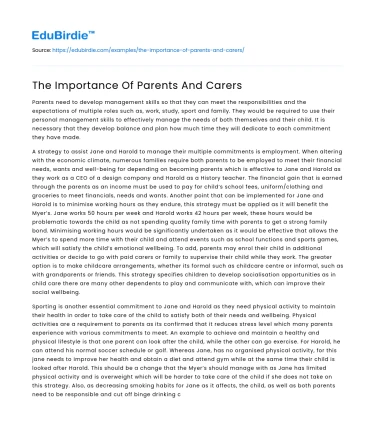Introduction
The role of parents and caregivers in the development of children is a multifaceted and indispensable one. They provide not just the basic necessities of life but also the emotional, social, and intellectual support that is fundamental for a child's holistic growth. Research consistently highlights the influence of familial relationships on children's cognitive and emotional development, emphasizing that the presence of attentive and nurturing caregivers can significantly enhance a child's well-being and future prospects. According to a study by the American Psychological Association, nurturing parenting leads to better academic performance and healthier social relationships (APA, 2020). This essay aims to explore the critical roles played by parents and caregivers, discuss the potential challenges they face, and address the arguments that question their importance in modern society.
Emotional and Social Development
Parents and caregivers are pivotal in fostering a child's emotional and social development. They offer a primary source of attachment, which is essential for the child's emotional security. This attachment is a building block for future relationships, providing a secure base from which children can explore their environment. John Bowlby's Attachment Theory underscores the importance of a child's relationship with their primary caregiver, positing that this bond is crucial for emotional stability and social competence (Bowlby, 1988). Through daily interactions, caregivers teach children how to express emotions, manage stress, and develop empathy, all of which are fundamental social skills.
Save your time!
We can take care of your essay
- Proper editing and formatting
- Free revision, title page, and bibliography
- Flexible prices and money-back guarantee
Furthermore, parents serve as role models in social interactions. By observing their caregivers, children learn crucial social norms and values, such as respect, cooperation, and responsibility. For instance, in regions where extended family structures prevail, children benefit from a wider array of role models, which can enrich their social learning. However, some argue that in contemporary society, with the rise of digital technology, the traditional role of caregivers is diminishing. Yet, a study by UNICEF reveals that despite technological advancements, children still value face-to-face interactions and seek guidance from trusted adults (UNICEF, 2021). Thus, the role of parents and caregivers in social learning remains irreplaceable.
Cognitive and Educational Support
In addition to emotional and social development, parents and caregivers play a crucial role in a child's cognitive and educational growth. They are often the child's first teachers, introducing them to language, numbers, and basic concepts. Studies have shown that early cognitive stimulation provided by caregivers can lead to improved academic performance and cognitive abilities later in life (Heckman, 2006). By engaging in activities such as reading aloud, playing educational games, and encouraging exploration, caregivers lay the groundwork for a lifelong love of learning.
Moreover, parents provide the support and encouragement needed for educational success. They can influence their children's attitudes towards learning and school by fostering a positive and supportive home environment. According to a report by the National Education Association, parental involvement is a significant predictor of academic achievement (NEA, 2018). Conversely, some critics argue that educational institutions should bear the primary responsibility for a child's academic development. However, this perspective overlooks the synergistic effect of parental involvement; the collaboration between schools and families is crucial for optimizing educational outcomes.
Challenges and Counterarguments
Despite the clear benefits, parents and caregivers face numerous challenges in fulfilling their roles. Economic pressures, work commitments, and social changes can limit the time and resources available for effective caregiving. Single-parent families, in particular, often encounter additional burdens, which can impact their ability to provide consistent support. A survey by the Pew Research Center found that single parents report feeling more stressed and less supported than their counterparts in two-parent households (Pew Research Center, 2019). These challenges highlight the need for societal support systems that empower caregivers to fulfill their roles effectively.
Additionally, some argue that children can thrive without traditional parental figures, citing instances of successful individuals raised in non-conventional settings. While it is true that resilience and adaptability can lead to positive outcomes despite adversity, these cases are exceptions rather than the norm. The majority of research supports the notion that a stable and nurturing caregiving environment is beneficial for most children. Therefore, while acknowledging alternative viewpoints, it is essential to recognize the overwhelming evidence supporting the critical role of parents and caregivers.
Conclusion
In conclusion, the role of parents and caregivers in child development is both profound and multifaceted. They are instrumental in shaping a child's emotional, social, cognitive, and educational journey. Despite the challenges they may face, their influence remains unparalleled. The evidence overwhelmingly supports the positive impact of nurturing and involved caregivers, underscoring the need for societal structures that support them in their roles. As we continue to navigate the complexities of modern life, it remains crucial to recognize and value the indispensable contributions of parents and caregivers. Their presence and guidance not only benefit individual children but also contribute to the betterment of society as a whole.






 Stuck on your essay?
Stuck on your essay?

